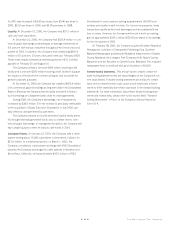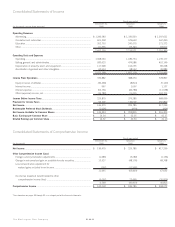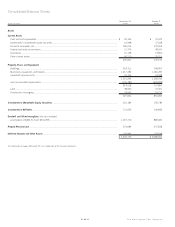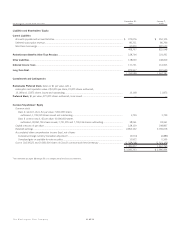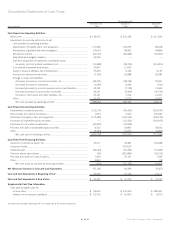Washington Post 2000 Annual Report Download - page 17
Download and view the complete annual report
Please find page 17 of the 2000 Washington Post annual report below. You can navigate through the pages in the report by either clicking on the pages listed below, or by using the keyword search tool below to find specific information within the annual report.
At December 31, 2000 and January 2, 2000, the average interest
rate on the Company’s outstanding commercial paper borrowings was
6.6 percent and 6.4 percent, respectively. The Company’s commercial
paper borrowings are supported by a five-year $500,000,000 revolving
credit facility and a one-year $250,000,000 revolving credit facility.
Under the terms of the $500,000,000 revolving credit facility,
interest on borrowings is at floating rates, and the Company is
required to pay an annual facility fee of 0.055 percent and 0.15 per-
cent on the unused and used portions of the facility, respectively.
Under the terms of the $250,000,000 revolving credit facility, interest
on borrowings is at floating rates, and the company is required to pay
a variable facility fee, ranging from 0.03 percent to 0.05 percent per
annum, on the used and unused portion of the facility. Both revolving
credit facilities contain certain covenants, including a financial
covenant that the Company maintain at least $850,000,000 of
consolidated shareholder’s equity.
The Company incurred interest costs on its borrowing of
$52,700,000 and $25,700,000 during 2000 and 1999, respectively,
of which $1,800,000 was capitalized in 1999 in connection with the
construction and upgrade of qualifying assets. No interest expense was
capitalized in 2000.
At December 31, 2000 and January 2, 2000, the fair value of
the Company’s 5.5 percent unsecured notes, based on quoted market
prices, totaled $376,200,000 and $353,920,000, respectively, com-
pared with the carrying amount of $397,881,000 and $397,620,000,
respectively.
The carrying value of the Company’s commercial paper borrowings
at December 31, 2000 and January 2, 2000 approximates fair value.
IF IREDEEMABLE PREFERRED STOCK
In connection with the acquisition of a cable television system in 1996,
the Company issued 11,947 shares of its Series A Preferred Stock.
On February 23, 2000, the Company issued an additional 1,275 shares
related to this transaction. During 1998, the Company redeemed
74 shares of the Series A Preferred Stock at the request of a Series A
Preferred Stockholder.
The Series A Preferred Stock has a par value of $1.00 per share
and a liquidation preference of $1,000 per share; it is redeemable by
the Company at any time on or after October 1, 2015 at a redemption
price of $1,000 per share. In addition, the holders of such stock have
a right to require the Company to purchase their shares at the redemp-
tion price during an annual 60-day election period, with the first such
period beginning on February 23, 2001. Dividends on the Series A
Preferred Stock are payable four times a year at the annual rate of
$80.00 per share and in preference to any dividends on the Company’s
common stock. The Series A Preferred Stock is not convertible into any
other security of the Company, and the holders thereof have no voting
rights except with respect to any proposed changes in the preferences
and special rights of such stock.
IG ICAPITAL STOCK, STOCK AWARDS, AND STOCK OPTIONS
Capital Stock. Each share of Class A common stock and Class B com-
mon stock participates equally in dividends. The Class B stock has
limited voting rights and as a class has the right to elect 30 percent of
the Board of Directors; the Class A stock has unlimited voting rights,
including the right to elect a majority of the Board of Directors.
During 2000, 1999, and 1998, the Company purchased a total of
200, 744,095, and 41,033 shares, respectively, of its Class B common
stock at a cost of approximately $96,000, $425,865,000, and
$20,512,000.
Stock Awards. In 1982, the Company adopted a long-term incentive
compensation plan, which, among other provisions, authorizes the
awarding of Class B common stock to key employees. Stock awards
made under this incentive compensation plan are subject to the gen-
eral restriction that stock awarded to a participant will be forfeited and
revert to Company ownership if the participant’s employment termi-
nates before the end of a specified period of service to the Company. At
December 31, 2000, there were 87,910 shares reserved for issuance
under the incentive compensation plan. Of this number, 30,165 shares
were subject to awards outstanding, and 57,745 shares were available
for future awards. Activity related to stock awards under the long-term
incentive compensation plan for the years ended December 31, 2000,
January 2, 2000, and January 3, 1999 was as follows:
2000 1999 1998
Number Average Number Average Number Average
of Award of Award of Award
Shares Price Shares Price Shares Price
Awards Outstanding
Beginning of year..... 31,360 $ 412.86 30,730 $ 405.40 32,331 $281.19
Awarded............... 1,155 501.72 2,615 543.02 14,120 522.56
Vested.................. (99) 330.75 (167) 349.00 (15,075) 244.10
Forfeited............... (2,251) 456.41 (1,818) 479.90 (646) 293.83
End of year .............. 30,165 $ 413.28 31,360 $ 412.86 30,730 $405.40
In addition to stock awards granted under the long-term incentive
compensation plan, the Company also made stock awards of 1,950
shares in 2000, 1,750 shares in 1999, and 938 shares in 1998.
For the share awards outstanding at December 31, 2000, the
aforementioned restriction will lapse in 2001 for 15,833 shares, in
2002 for 1,371 shares, in 2003 for 16,649 shares, and in 2004 for
2,050 shares. Stock-based compensation costs resulting from stock
awards reduced net income by $2.4 million ($0.25 per share, basic
and diluted), $2.2 million ($0.22 per share, basic and diluted), and
$1.9 million ($0.19 per share, basic and diluted), in 2000, 1999, and
1998, respectively.
42 The Washington Post Company


